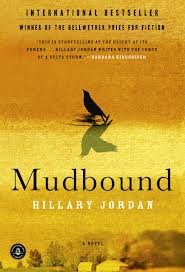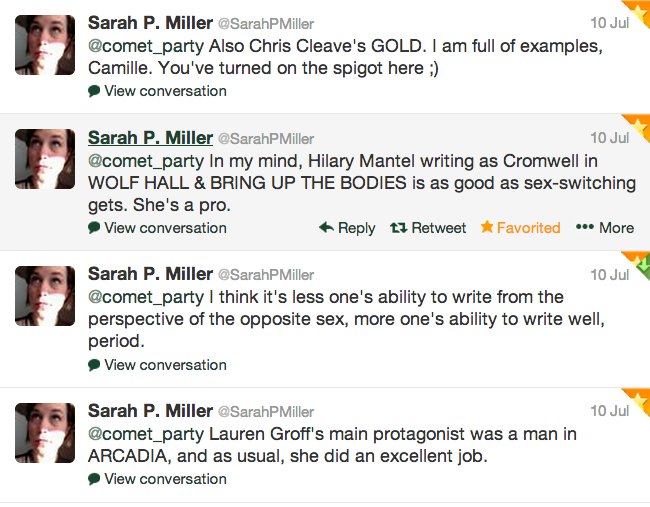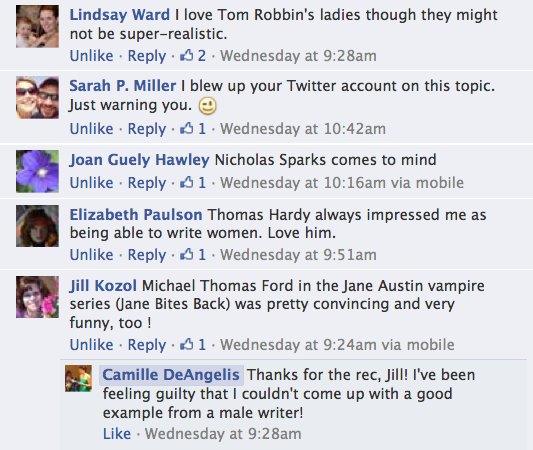FAQ: Switching Sexes
...It remains obvious, even in the writing of Proust, that a man is terribly hampered and partial in his knowledge of women, as a woman in her knowledge of men.
Here's a question posed by one of the boys at St. Lawrence: I noticed that the protagonists of both your novels are female. Are you ever going to write a story from a male perspective?One of the best writing compliments I ever received arrived by text message. I still have it saved on my phone nearly six years later.
Hi camille! I'm about 150 pages in & i really like your book! The attention to detail often leads to moments of sublimity in the prose, & your treatment of & insight into the male psyche is surprisingly accurate!! I'm reading every chance i get...
The friend who sent it is, of course, a man—and to be perfectly honest with you, I'm not sure how I pulled it off.Then again, if we define convincing literary "sex switching" in terms of the reader being so engrossed in the story as to forget the sex of the person who wrote it, then maybe I wasn't as successful as my friend would have me think. There's no denying that men and women differ in fundamental ways—physically, biochemically, et cetera. I thought it would be fun to offer a couple examples of sex switching in literary fiction—one I find successful, one not—and see if anyone else can think of authors who can get inside the minds of the opposite sex particularly well.The first example is a passage chosen at random from Hillary Jordan's Mudbound:
I thought it would be fun to offer a couple examples of sex switching in literary fiction—one I find successful, one not—and see if anyone else can think of authors who can get inside the minds of the opposite sex particularly well.The first example is a passage chosen at random from Hillary Jordan's Mudbound:
The war broke my brother—in his head, where no one could see it. Never mind all his clever banter, his flirting with Laura and the girls. I could tell he wasn't right the second I saw him. He was thin and jittery, and his eyes had a haunted look I recognized from my own time in the Army. I knew too well what kind of sights they were seeing when he shut them at night.
Jamie was thin-skinned to begin with, had been all his life. He was always looking for praise, then getting his feelings hurt when he didn't get it, or enough of it. And he never knew his own worth, not in his guts where a man needs to know it. Our father was to blame for that. He was always whittling away at Jamie, trying to make him smaller...
It was only after I'd finished Mudbound that I thought, wow, Hillary Jordan knows how to get into the mind of a man. I suppose I should get a man's opinion on this, but I was convinced anyway!Now here's an example of sex switching I found distracting:
Changing the subject abruptly, Ines remarked: There are some really good-looking men. Yes, there are some I find very attractive. There are some I find extremely attractive. Well, me too, if we're going to extremes. But, you know, they can turn out to be bastards. Yeah, of course; that's always happening on TV. But that's fake. Didn't you just say...? No, what I'm saying is they can be bastards. Like they can be anything, Ines added. Oh, OK, all right. But the really important thing, in love, is to find a real man. Not the real men again! exclaimed Patri. That's what mom's always telling me. Well she knows what she's talking about, I promise you. How does she know? Ines shrugged her shoulders...
That's from César Aira's Ghosts. Maybe it's just the company I run in, but I don't know any women who talk about men this way; perhaps I'm discounting cultural differences, but I'm not convinced. At any rate, the whole time I was reading this passage I was acutely conscious of the author's sex. As I said, if he'd actually nailed the tenor of this conversation between a teenage girl and her "hip" young aunt, I wouldn't be thinking of the fact that a woman did not write it. (The novel's complete lack of paragraphs and quotation marks drives me batty too, but that's for a different blog post.)In A Room of One's Own, Virginia Woolf recants her earlier assertion (see epigraph) that writers of both sexes are hindered by the utter inaccessibility of one half of the human experience.
...I went on amateurishly to sketch a plan of the soul so that in each of us two powers preside, one male, one female; and in the man's brain, the man predominates over the woman, and in the woman's brain, the woman predominates over the man. The normal and comfortable state of being is that when the two live in harmony together, spiritually co-operating. If one is a man, still the woman part of the brain must have effect; and a woman also must have intercourse with the man in her. Coleridge perhaps meant this when he said that a great mind is androgynous...
I like the concept of an "androgynous mind." Maybe this matter of writing men (or women) convincingly isn't simply a question of having a big enough imagination—if we can actually tap into a sort of Jungian reservoir of human experience, and funnel that knowledge into an act of creative empathy.And if that sounds like new-age nonsense, is writing a man as a woman all that different from writing about a woman as a woman? You're already seeing through someone else's eyes—someone whose experience differs from yours, even though you made the person up yourself.But to answer the student's question: yes, I am very interested in writing a novel from a male perspective, and excited for the challenge. In 2007 I started what I hoped would be a novel narrated by a man, but I wound up shelving it when Seanan remarked that the first chapter had the pacing of a shorter story. I haven't given up on that one, but in the meantime my second novel for St. Martin's, Immaculate Heart, is narrated by a male journalist. Working on this story is a whole new kind of fun.This was an excellent question, and I'd love to get some input from other readers and writers (especially since I didn't offer a positive example from a male author). Writers, how comfortable do you feel writing from a male point of view as a woman, or vice versa? Readers, what are some of your favorite examples of male writers who've nailed the inner workings of a female character, and vice versa?
@sarahpmiller Thanks for all the great examples/recs! Interesting to me that you're also coming up with more female than male writers...-- Camille DeAngelis (@comet_party) July 10, 2013
@comet_party I really don't know. I'd be interested to hear what men think about that.-- Sarah P. Miller (@SarahPMiller) July 11, 2013

